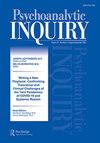结语:小说人物:精神分析与文学视角
IF 0.5
4区 心理学
Q3 PSYCHOLOGY, PSYCHOANALYSIS
引用次数: 0
摘要
据说,一些有学识的中世纪僧侣正在争论马有多少牙齿的问题,这似乎是一个至关重要的问题,亚里士多德对此保持沉默。一个不识字的兄弟听到了这场辩论,建议他可以到拴着马的地方去数它的牙齿。僧侣们很自然地斥责他厚颜无耻。同样,英国文学学者对小说以及将其与作者联系起来是否合法也有很多争论。弗雷德·格里芬显然不是文盲,我也不知道他曾因努力为一些文学辩论提供答案而受到攻击,但和这位外行兄弟一样,他决定实证研究其中一些问题,“让作者自己说话”,而不是将理论还原论视为“普鲁斯特式的床”。格里芬指出了写小说的“治疗潜力”,引用了弗吉尼亚·伍尔夫的评论,即写《致灯塔》帮助她为母亲的去世感到悲伤。格里芬从个人经历中学到,将痛苦的经历转化为小说可以让人有足够的情感距离来加深对创伤的理解。在威廉·马克斯韦尔、阿诺斯特·卢斯蒂格、伊丽莎白·扬布鲁尔和科林·托宾的作品中都有类似的主题之后,格里芬对小说家和短篇小说作家希拉·科勒进行了引人入胜的采访。在某种程度上,克里斯托弗·米勒的整篇文章令人信服地掩盖了马尔沃利奥在《第十二夜》中的最后一句话,这句话让欢乐的观众感到失望:“我会为你们所有人复仇。”米勒深入探讨了这部剧的复杂性,因为莎士比亚在他的戏剧中从未完全区分喜剧和黑暗、悲剧的主题。米勒巧妙地展示了我们观众是如何暗中串通将马尔沃利奥作为替罪羊的,就像剧中的其他角色——米勒将其比作“驮畜”——投射地将他们的一些“被鄙视的元素”,如自爱,归咎于他,并限制了我们对马尔沃利奥的同情。通过群体思维(“群体心态”)的动态,对马尔沃里奥进行错误的创作,给其他角色——以及观众——一种有凝聚力的群体认同感。米勒仔细阅读莎士比亚的话,就像我们试图仔细倾听病人的话一样。他指的是马尔沃里奥暂时“坠入地狱”,因为他被锁在一个小房间里,用煤气灯照明。我们可能还记得,奥德修斯、俄耳甫斯和耶稣等古代英雄人物也曾访问过阴间,并像马尔沃利奥一样从那里回来。托比声称马尔沃利奥在黑暗的房间里“忏悔”,可能是在暗指炼狱。Paula Marantz Cohen的这篇高度压缩的文章以一个悲伤的故事开场,讲述了她痴迷于理论的大学英语教授对她大二的文章的非理性贬低,指责Cohen“将虚构人物与真人混为一谈”。她很快学会了写老师想要的东西,而不是让自己的心来激励她。她在读研究生院时,带我们参观了文学批评不断变化的时尚,后来她自己也成为了一名英语教授。科恩从不允许自己被当今的理论洗脑。她发现阅读反应理论是最合适的理论。她有说服力地得出结论:“与其说我们现在能看到文学人物的真实,不如说我们能看到自己像文学人物一样。”她将家庭代际反犹太主义创伤与对亚伯拉罕和艾萨克的评论联系起来。科恩描绘了一条文学发展路线,从莎士比亚的独白到19世纪英国小说中人物突出的内心生活——用科恩令人难忘的话来说,是“阴险的保姆”。在她引人注目的结尾本文章由计算机程序翻译,如有差异,请以英文原文为准。
Epilogue: Fictional Characters: Psychoanalytic and Literary Perspectives
The story goes that some learned medieval monks were debating the question of how many teeth horses had, a seemingly crucial issue, on which Aristotle was silent. Overhearing the debate, an illiterate lay brother suggested that he could go outside where a horse was tied up, and count its teeth. The monks naturally rebuked him for his effrontery. Similarly, English literature scholars have many debates about novels and whether it’s legitimate to connect them with their authors. Fred Griffin is clearly not illiterate, and I’m not aware he’s ever been attacked for his efforts to provide answers to some of these literary debates, but, like the lay brother, he decided to investigate some of these questions empirically, “letting the authors speak for themselves,” rather than to treat theory reductionistically as a “Procrustean bed.” Griffin notes the “therapeutic potentials” of writing fiction, citing Virginia Woolf’s comment that writing To the Lighthouse helped her grieve her mother’s death. Griffin learned from personal experience that transforming painful experiences into fiction allows enough emotional distance to deepen one’s understanding of trauma. After writing of similar themes in the works of William Maxwell, Arnost Lustig, Elizabeth YoungBruehl, and Colin Toibin, Griffin presents his fascinating interview with the novelist and short story writer Sheila Kohler. In some ways, Christopher Miller’s entire essay persuasively glosses Malvolio’s final words in Twelfth Night, which bring the mirthful audience up short: “I’ll be revenged on the whole pack of you.” Miller probes deeply into the play’s complexity, since Shakespeare never fully separates comic from darker, tragic themes in his dramas. Miller skillfully shows how we, the audience, implicitly collude in scapegoating Malvolio, as other characters in the play – whom Miller compares with “pack animals” – projectively identify some of their “despised elements” such as self-love onto him, and limit our empathy for Malvolio. Mistreating Malvolio, through the dynamics of groupthink (“the group’s mindset”), gives the other characters – as well as the audience – a sense of cohesive group identity. Miller reads Shakespeare’s words closely, just as we try to listen closely to our patient’s words. He refers to Malvolio’s temporary “descent into hell,” as he’s locked in a small room and gaslighted. We might remember that ancient heroic figures such as Odysseus, Orpheus, and Jesus also visited the underworld and, like Malvolio, returned from it. Toby may be alluding to purgatory in claiming that Malvolio is in the dark room for his “penance.” Paula Marantz Cohen’s highly compressed article opens with a sad tale of an irrational putdown of her sophomore essay from her theory-obsessed college English professor, accusing Cohen of “confusing fictional characters with real people.” She quickly learned to write what her teachers wanted, rather than allowing her own heart to inspire her. She takes us on a tour of the changing fashions of literary criticism as she attended graduate school, then became an English professor herself. Cohen never allowed herself to be brainwashed by the theories du jour. She found readerresponse theory to be the most congenial one. She cogently concludes that “It’s not so much that we can now see literary characters as real as that we can see ourselves as being like literary characters.” She links her family’s intergenerational anti-Semitic traumas with commentaries on Abraham and Isaac. Cohen sketches a sort of literary developmental line from Shakespeare’s soliloquies to the prominent internal lives of the characters in 19th-century English novels – influentially “insidious babysitters,” in Cohen’s memorable phrase. At the end of her compelling
求助全文
通过发布文献求助,成功后即可免费获取论文全文。
去求助
来源期刊

Psychoanalytic Inquiry
PSYCHOLOGY, PSYCHOANALYSIS-
CiteScore
1.00
自引率
33.30%
发文量
65
期刊介绍:
Now published five times a year, Psychoanalytic Inquiry (PI) retains distinction in the world of clinical publishing as a genuinely monographic journal. By dedicating each issue to a single topic, PI achieves a depth of coverage unique to the journal format; by virtue of the topical focus of each issue, it functions as a monograph series covering the most timely issues - theoretical, clinical, developmental , and institutional - before the field. Recent issues, focusing on Unconscious Communication, OCD, Movement and and Body Experience in Exploratory Therapy, Objct Relations, and Motivation, have found an appreciative readership among analysts, psychiatrists, clinical psychologists and a broad range of scholars in the humanities.
 求助内容:
求助内容: 应助结果提醒方式:
应助结果提醒方式:


